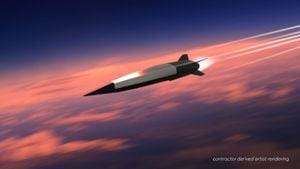The Arctic is experiencing some of the most dramatic climate changes on our planet, making weather forecasting there more critical than ever. To tackle this challenge, the European Space Agency (ESA) has launched its Arctic Weather Satellite prototype, aimed at enhancing weather predictions for the unpredictable polar region.
Unlike traditional weather satellites, this new satellite is armed with advanced technology, including a 19-channel microwave radiometer. This gadget can provide high-resolution atmospheric humidity and temperature data across all weather conditions, allowing for more accurate forecasts.
This satellite is not just a standalone mission; it’s the beginning of something bigger. If successful, it could pave the way for a full constellation of satellites called EPS-Sterna, which ESA aims to develop for Eumetsat.
Meanwhile, over the Atlantic, the National Oceanic and Atmospheric Administration (NOAA) continues to make strides with its GOES-19 satellite, launched on June 25, 2024. Equipped with the Goddard Magnetometer (GMAG), this satellite recently started transmitting valuable magnetic field measurements back to Earth.
The GOES-19 satellite enhances air and space weather observations through its upgraded magnetometer. This tool significantly improves our ability to measure Earth’s magnetic field, offering insights necessary for safeguarding both satellites and astronauts from hazardous space weather phenomena.
One of the intriguing aspects of the data from GOES-19 involves electromagnetic ion cyclotron (EMIC) waves, which influence the movement of energetic particles. Understanding these waves is critical since they can damage satellites and impact human activities beyond Earth.
While the GOES-19 and Arctic Weather Satellites focus on weather and space phenomena, another layer of complexity arises with the satellite congestion overhead. SpaceX's Starlink, which has launched thousands of satellites for broadband internet service, has come under scrutiny for its potential environmental impacts.
The US Public Interest Research Group (US PIRG) recently called on the Federal Communications Commission (FCC) to pause low Earth orbit satellite launches. Their demand stems from growing concerns over the potential consequences of space debris and pollution resulting from these burgeoning mega-constellations.
SpaceX, often dubbed 'WasteX' by critics, has launched over 6,000 satellites, accounting for roughly 60% of all satellites currently orbiting Earth. The advocates worry these mega-constellations could increase the already pressing issue of space debris, which could threaten both space navigation and ground safety.
China's recent launch added to this concern when its Long March 6A rocket broke apart and scattered debris across low Earth orbit. US Space Command reported tracking around 300 pieces of debris, escalating worries over space traffic management.
The environmental ramifications of launching such massive amounts of satellites are not just theoretical. Experts have warned there are over 200 million pieces of orbital debris capable of colliding with operational satellites.
One alarming incident was highlighted by Clara Moskowitz of Scientific American, who noted how debris from the International Space Station fell through the roof of a house just two months ago. She remarked, "With the whole Space Station due to become trash in 2030, it's time we got serious about the waste in space."
One potential solution involving active debris remediation has gained legislative traction. The Orbital Sustainability (ORBITS) Act aims to allocate resources to clean up existing space debris and establish missions to remove wreckage.
Supported by both sides of Congress, this act could help restore some order to Earth's orbital highways. Representative Carol Miller (R-WV), co-sponsor of the act, stressed the importance of reducing debris as the United States invests more heavily in space exploration.
Even as initiatives like the ORBITS Act emerge, the pressure remains on agencies and companies alike to address these environmental concerns effectively. With intense scrutiny from environmental groups and the public alike, younger generations are demanding accountability as we continue to explore the final frontier.
Without careful management and foresight, the rapid proliferation of satellites could leave us grappling with issues on par with terrestrial pollution. The intersection of innovation and responsibility will define the future of space exploration.
While satellites are pivotal for our daily lives—from weather forecasting to global communications—balancing their benefits against environmental risks is becoming increasingly important. Thus, the global community must find pathways to maintain technological advancements without sacrificing the safety of our orbital domains.
Such precautions are not just relevant for Earth but also for potential future missions to the Moon and Mars. By tackling these pressing ISSUES today, we can safely advance our exploration efforts without jeopardizing our planetary home.
To balance resource usage against environmental impact, agencies like NOAA and ESA must remain vigilant. This responsible approach will pave the way for sustainable satellite developments and the continued growth of space-based technologies.
Indeed, our relationship with space will evolve as we learn to adapt to its challenges. Technology without the foresight of sustainability could risk the very systems we depend upon.
With challenges come opportunities, and it will be the innovators, scientists, and policy-makers who determine how we navigate these new frontiers. The weight of our choices today has far-reaching consequences for generations to come.



